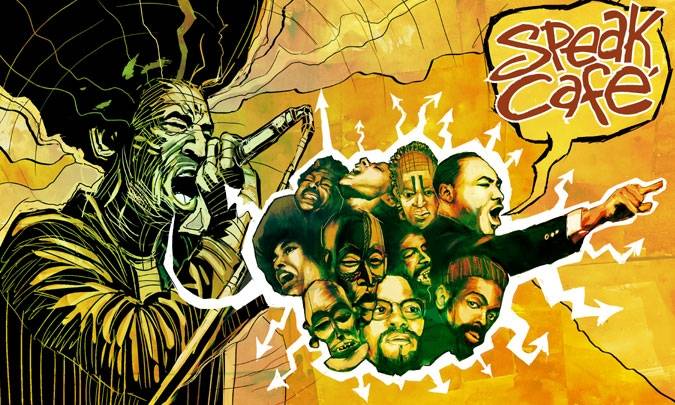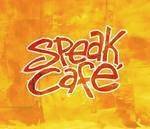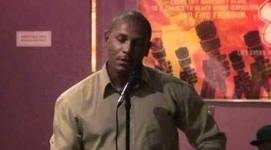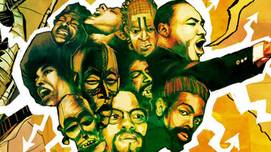
Song. Poetry. Expression. Art. Knowledge. SPEAK Café is an ongoing series of open mic spoken word performances hosted by Aaron Ammons, who has organized each event since the assembly’s second year. While he calls Krannert Art Museum the base location for the gatherings, they’ve have been held at other locations such as Champaign Central, Centennial High School, and the IMC.
 “I did one at the Danville Correctional facility about a year ago,” he said. “The citizens who are incarcerated there, many of them are extremely talented artists. There’s a group of about six of them who participated as well.”
“I did one at the Danville Correctional facility about a year ago,” he said. “The citizens who are incarcerated there, many of them are extremely talented artists. There’s a group of about six of them who participated as well.”
The original aim for SPEAK Café was to revisit the Black Power movement, but the project remains broad in scope. “I think the essence has been as an invitation to artists of all walks of life and all types of art,” Ammons said. “Ultimately I think the mission is to encourage people to find their voice and speak truth to power or to find the space to express themselves and get whatever’s on their chest off in an artistic way.”
According to Ammons, when people find their voice, they’re liberated. “It gives you the freedom, it gives you the ability to be yourself, and in a society where people are attacked for being themselves for various reasons I think that it’s essential that you have something that’s a space like SPEAK Café for people to feel free to be who they are.”
SPEAK happens six times a year and brings a good-sized, diverse crowd. For those interested in the private lives of public officials, District 2 Councilman Michael LaDue reads poetry at every event (“I have to tell him to stop sometimes,” said Ammons). “It runs the gamut,” Ammons said. “We’ve had older people who come who used to write, and they say they want to share something today. A gentleman in his upper 80s came for the ‘K’ in knowledge to tell a story about how he’s seen progress in the country based on where he came from and where he is now, so people share knowledge like that.” And on the flip side, also welcome are children as young as six years old—the age Ammons’ son was when he started attending.
 Ammons said that performances don’t necessarily sit at either end of a “knowledge and poetry spectrum.” “From a performance standpoint, it ranges from an actual performance to someone coming up to simply share knowledge.” Topics range broadly, covering intimate family issues and tributes to loved ones to more timely subjects. First-time performers are also encouraged. “People come because they thought it was a contest or something, and then they come up to me during the break and ask me to put their name on the list because they want to perform. After they see the culture and what the space is about, they feel more comfortable.”
Ammons said that performances don’t necessarily sit at either end of a “knowledge and poetry spectrum.” “From a performance standpoint, it ranges from an actual performance to someone coming up to simply share knowledge.” Topics range broadly, covering intimate family issues and tributes to loved ones to more timely subjects. First-time performers are also encouraged. “People come because they thought it was a contest or something, and then they come up to me during the break and ask me to put their name on the list because they want to perform. After they see the culture and what the space is about, they feel more comfortable.”
As a host, Ammons not only analyzes content and form, but the presentation of performers’ work. “As an artist I think it’s important that we understand the process as well as the finished product. I’m not telling people that you have to have your stuff memorized and you have to perform it like you’re on HBO Def Poetry Jams. But I also think it’s best that it serves the purpose of getting your point across if you’ve been practicing. People now want to come up with their phones and it cuts off and they’re like ‘oh okay, well wait a minute let me turn this back on’ and it disrupts the flow of what you’re trying to bring forward so we do want to encourage people to go through this and have yourself ready to go unless you just wrote something while you were listening and want to bring it up.”
The selling point for a newcomer is the chance to see some great performances in an informal setting and maybe even speak some knowledge yourself. Who knows? If nothing else, they always have pie.








